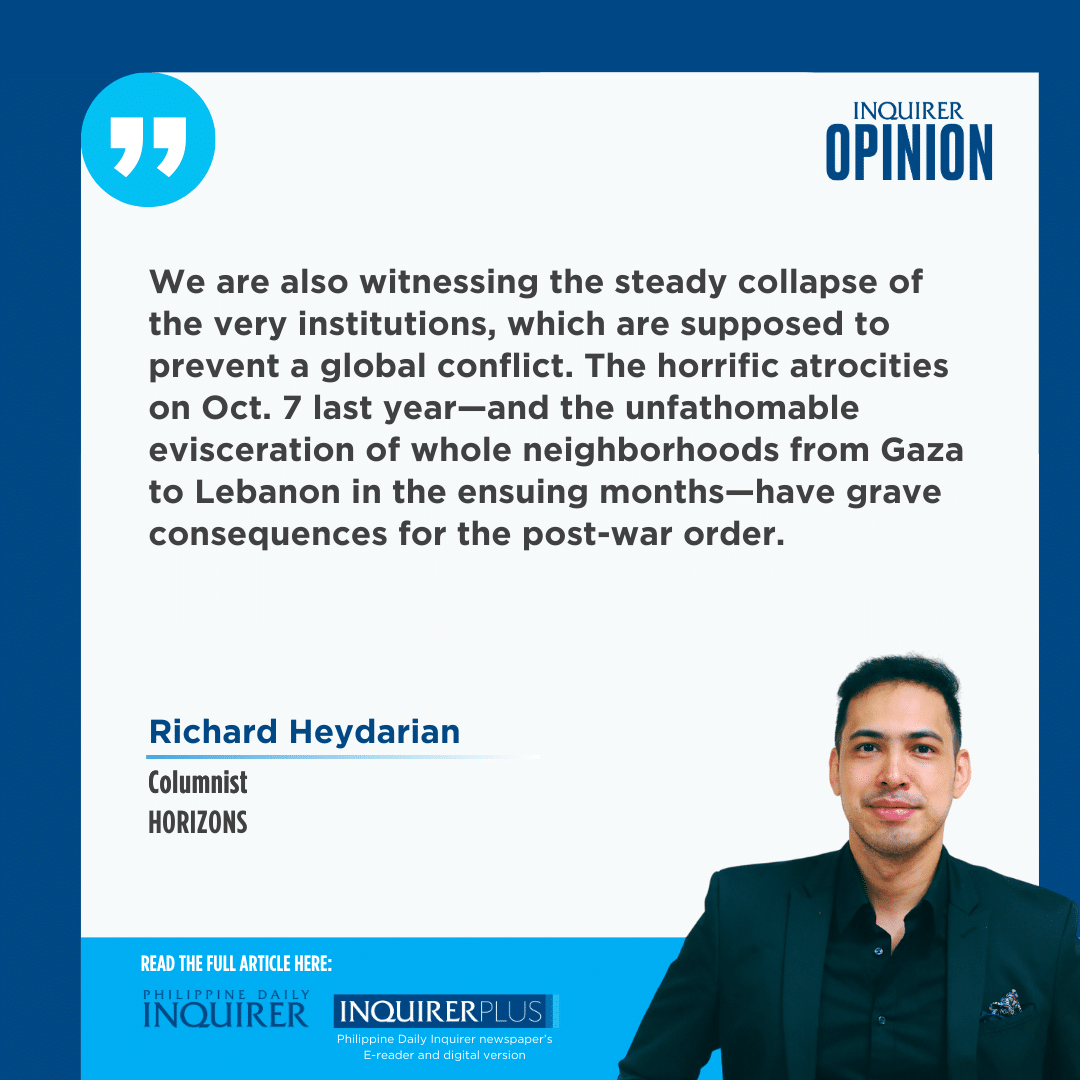BRICS, Gaza, and graveyard of int’l law
By all indications, we live in an era best described by the historian Adam Tooze as a “polycrisis.” A term coined by the French philosopher Edgar Morin, it refers to the simultaneous eruption of multiple, interacting existential challenges with their own distinct centers of gravity. Individually, each of them seems manageable, but they could collectively overwhelm the international system with dire consequences for humanity.
But way before climate change and artificial intelligence (AI) fully alter our lives, humanity could end up sealing its own fate through destructive nihilism and untrammeled militarism. The month of October treated the world with many geopolitical surprises, which should alert us to the distinct prospect of a global conflict.
Article continues after this advertisementThink of the tit-for-tat missile exchanges between the two most powerful nations in the Middle East. There are reasons to believe that the two antagonists are still committed to calibrating their direct confrontation, but the risk of a regional conflagration with the direct participation of superpowers is still within the realm of possibility—especially if we get a swashbuckling version of a Trump 2.0 presidency next year.
On a more fundamental level, however, we are also witnessing the steady collapse of the very institutions, which are supposed to prevent a global conflict. The horrific atrocities on Oct. 7 last year—and the unfathomable evisceration of whole neighborhoods from Gaza to Lebanon in the ensuing months—have grave consequences for the post-war order.
After spending years rallying the Global South against Vladimir Putin’s barbaric invasion of sovereign Ukraine, the West is now on the back foot—both geopolitically and morally. Nothing better captures this mega-reversal than the latest edition of the BRICS Plus Summit in Kazan, Russia, where Putin giddily welcomed the leaders of the most powerful non-Western nations on earth. If anything, the likes of Türkiye, Saudi Arabia, and Malaysia are lining up to join the BRICS, which is increasingly positioning itself as a springboard for a post-Western international order.
Article continues after this advertisementThe seamless “de-stigmatization” of the Russian leader, who is facing a warrant of arrest by the International Criminal Court (ICC) for atrocities committed against Ukrainian civilians in 2022, has everything to do with the devastating conflict in the Middle East. Tens of thousands of children, women, and innocent civilians have perished in brutal military operations by Western powers. According to an Oxfam estimate, the death rates in Gaza over the past year surpass even the deadliest years in comparable conflicts from Iraq to Syria. In response, multiple leading nations from the Global South have backed an ongoing genocide case against a key United States ally before the International Court of Justice.
The Joseph Biden administration, however, has neither genuinely reconsidered its arms supply to ongoing military operations in Gaza and Lebanon nor has it supported any international scrutiny of alleged war crimes. If anything, it has even threatened ICC with sanctions after the latter mulled warrants of arrest against top Israeli leaders.
Many observers, who have rightly condemned Russia’s invasion of Ukraine and are now witnessing the unfolding humanitarian catastrophe in Gaza, are openly warning that the Middle East could end up as the graveyard of international law. Lest we forget, this is the same region that has witnessed countless Western military interventions based on questionable grounds and—as in notable cases like Iraq—in contravention of international law. And this is the same region where millions of innocent civilians have unjustifiably suffered for years due to collective and debilitating sanctions levied on their nations’ entire financial and trading systems.
Biden’s policies may ultimately also cost his party the upcoming elections. While exhibiting much greater symmetry in empathy for civilian lives in ongoing conflicts in the Middle East, Vice President Kamala Harris has alienated a huge number of Muslim-American and progressive voters in swing states, most dramatically in Michigan, by refusing to back an unconditional and swift ceasefire. Paradoxically, Donald Trump has deftly portrayed himself as the tough negotiator who could swiftly end multiplane ongoing conflicts by directly dealing with the strongmen antagonists. Unsurprisingly, he has picked up endorsements by Muslim-American groups and is leading among Arab-American voters in polls. The impending return of Trump to the White House will likely not only upend American democracy at home but also accelerate the breakdown of the post-war international system at large.
—————
rheydarian@inquirer.com.ph

















